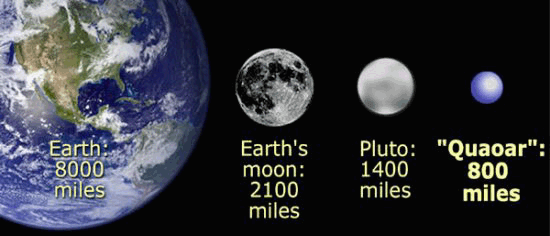Have they found a new planet in our solar system?
![]()
No, they have not found a new planet - a 10th planet - in our solar system. What was discovered was another object in the growing list of objects called "Kuiper Belt Objects" or KBOs. The Kuiper Belt is a disk-shaped region out past the orbit of Neptune, roughly 30 to 100 AU from the Sun. It contains many small (and some large) icy and rocky bodies. From time to time, a KBO will have its orbit disturbed in some way so that its orbit changes to cross inside that of Neptune. Eventually, it will have a gravitational encounter with that planet which will result in the KBO either being ejected from our solar system or falling in closer to the Sun.
It is estimated that at least 35,000 KBOs are larger than 100 km in diameter. Several larger KBOs have also been discovered. Recently, great news coverage has been given to one such object which is tentatively named "Quaoar" (pronounced kwa-whar). The name honors a Native American god. This object has a diameter of about 1300 km, roughly half the size of Pluto.

With our ever-increasing ability to observe small, distant objects, we are finding more and more objects similar to Pluto which orbit in the Kuiper Belt. Several years ago, this led to a discussion of whether or not Pluto should be reclassified as a KBO or kept as a planet. This matter was resolved by the International Astronomical Union. They said that Pluto would retain its classification as our ninth planet. So most astronomers now consider Pluto as BOTH a KBO and a planet. Clearly, if Pluto were discovered today rather than over 70 years ago, it would not be called a planet just as all of the similar objects now being found far from the Sun are not classified as planets.
So, for now, our solar system remains with 9 planets.
Read more about Quaoar.![]()
The StarChild site is a service of the High Energy Astrophysics Science Archive Research Center (HEASARC), within the Astrophysics Science Division (ASD) at NASA/ GSFC.
StarChild Authors: The StarChild Team
StarChild Graphics & Music: Acknowledgments
StarChild Project Leader: Dr. Laura A.
Whitlock
Curator:
Responsible NASA Official: